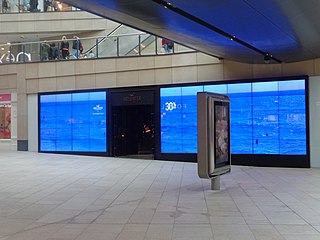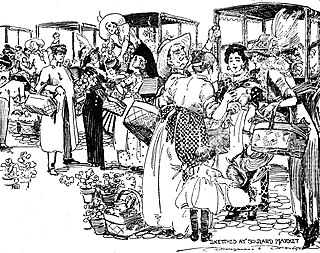Wired is a monthly American magazine, published in print and online editions, that focuses on how emerging technologies affect culture, the economy, and politics. Owned by Condé Nast, its editorial offices are in San Francisco, California, and its business office at Condé Nast headquarters in Liberty Tower in New York City. Wired has been in publication since its launch in January 1993. Several spin-offs have followed, including Wired UK, Wired Italia, Wired Japan, Wired Czech Republic and Slovakia and Wired Germany.
The New York Times Best Seller list is widely considered the preeminent list of best-selling books in the United States. Since October 12, 1931, The New York Times Book Review has published the list weekly. In the 21st century, it has evolved into multiple lists, grouped by genre and format, including fiction and nonfiction, hardcover, paperback and electronic.

Sales are activities related to selling or the number of goods sold in a given targeted time period. The delivery of a service for a cost is also considered a sale. A period during which goods are sold for a reduced price may also be referred to as a "sale".
A bestseller is a book or other media noted for its top selling status, with bestseller lists published by newspapers, magazines, and book store chains. Some lists are broken down into classifications and specialties. An author may also be referred to as a bestseller if their work often appears in a list. Well-known bestseller lists in the U.S. are published by Publishers Weekly, USA Today, The New York Times, and IndieBound. The New York Times tracks book sales from national and independent bookstores, as well as sales from major internet retailers such as Amazon.com and Barnes & Noble.

In statistics and business, a long tail of some distributions of numbers is the portion of the distribution having many occurrences far from the "head" or central part of the distribution. The distribution could involve popularities, random numbers of occurrences of events with various probabilities, etc. The term is often used loosely, with no definition or an arbitrary definition, but precise definitions are possible.

Chris Anderson is an English-American author and entrepreneur. He was with The Economist for seven years before joining Wired magazine in 2001, where he was the editor-in-chief until 2012. He is known for his 2004 article entitled "The Long Tail", which he later expanded into the 2006 book, The Long Tail: Why the Future of Business Is Selling Less of More. He is the cofounder and current CEO of 3D Robotics, a drone manufacturing company.

A business can use a variety of pricing strategies when selling a product or service. To determine the most effective pricing strategy for a company, senior executives need to first identify the company's pricing position, pricing segment, pricing capability and their competitive pricing reaction strategy. Pricing strategies and tactics vary from company to company, and also differ across countries, cultures, industries and over time, with the maturing of industries and markets and changes in wider economic conditions.

Auction sniping is the practice, in a timed online auction, of placing a bid likely to exceed the current highest bid as late as possible—usually seconds before the end of the auction—giving other bidders no time to outbid the sniper. This can be done either manually or by software on the bidder's computer, or by an online sniping service.

Etsy, Inc. is an American e-commerce company with an emphasis on the selling of handmade or vintage items and craft supplies. These items fall under a wide range of categories, including jewelry, bags, clothing, home décor, religious items and furniture, toys, art, as well as craft supplies and tools. Items described as vintage must be at least 20 years old. The site follows in the tradition of open craft fairs, giving sellers personal storefronts where they list their goods for a fee of US$0.20 per item. Beginning in 2013, Etsy allowed sellers to sell mass-manufactured items.
Upselling is a sales technique where a seller invites the customer to purchase more expensive items, upgrades, or other add-ons to generate more revenue. While it usually involves marketing more profitable services or products, it can be simply exposing the customer to other options that were perhaps not considered.

Freemium, a portmanteau of the words "free" and "premium", is a pricing strategy by which a basic product or service is provided free of charge, but money is charged for additional features, services, or virtual (online) or physical (offline) goods that expand the functionality of the free version of the software. This business model has been used in the software industry since the 1980s. A subset of this model used by the video game industry is called free-to-play.
In finance, the private-equity secondary market refers to the buying and selling of pre-existing investor commitments to private-equity and other alternative investment funds. Given the absence of established trading markets for these interests, the transfer of interests in private-equity funds as well as hedge funds can be more complex and labor-intensive.

Birdmonster is an American rock band based in San Francisco, California.
A marketing channel consists of the people, organizations, and activities necessary to transfer the ownership of goods from the point of production to the point of consumption. It is the way products get to the end-user, the consumer; and is also known as a distribution channel. A marketing channel is a useful tool for management, and is crucial to creating an effective and well-planned marketing strategy.

Free: The Future of a Radical Price is the second book written by Chris Anderson, editor-in-chief of Wired magazine. The book was published on July 7, 2009, by Hyperion. Free is Anderson's follow-up to his book The Long Tail, published in 2006.
BigChampagne was a technology-driven media measurement company acquired by Live Nation Entertainment. The BigChampagne dashboard was used primarily by music industry professionals such as concert promoters, venues, radio programmers, managers, agents, and marketers to access information about the popularity of artists and songs across radio airplay, online streaming, social activity, sales, and live events. BigChampagne provided a number of services related to producing business intelligence (BI) and competitive intelligence (CI) for users of the dashboard via access to proprietary data and data management combined with web applications and other technologies.
The new manufacturing economy (NME) describes the role of advanced manufacturing in the rise of the New Economy. The term describes manufacturing enabled by digital technologies, advanced systems and processes and a highly trained and knowledgeable workforce. The new manufacturing economy integrates networks, 3D printers and other proficiencies into business strategies to further develop manufacturing practices.
In the United States, a film's box office gross in its second weekend of theatrical release is one of several factors used to predict overall box office performance. Most films experience a decline in box office gross in their second weekend, but a significant decline often indicates a subpar box office performance for the rest of a film's theatrical run. Some films are exceptions in that they perform better in their second weekend of release than on opening weekend.

Ecast, Inc. was a privately held, venture capital–backed place-based interactive media company that offered advertising, digital music, games, entertainment, and information to bars and nightclubs in the United States. The company was founded in 1999 and was headquartered in San Francisco, California. Ecast, Inc. ceased operations when it closed its Jukebox network on March 1, 2012.










